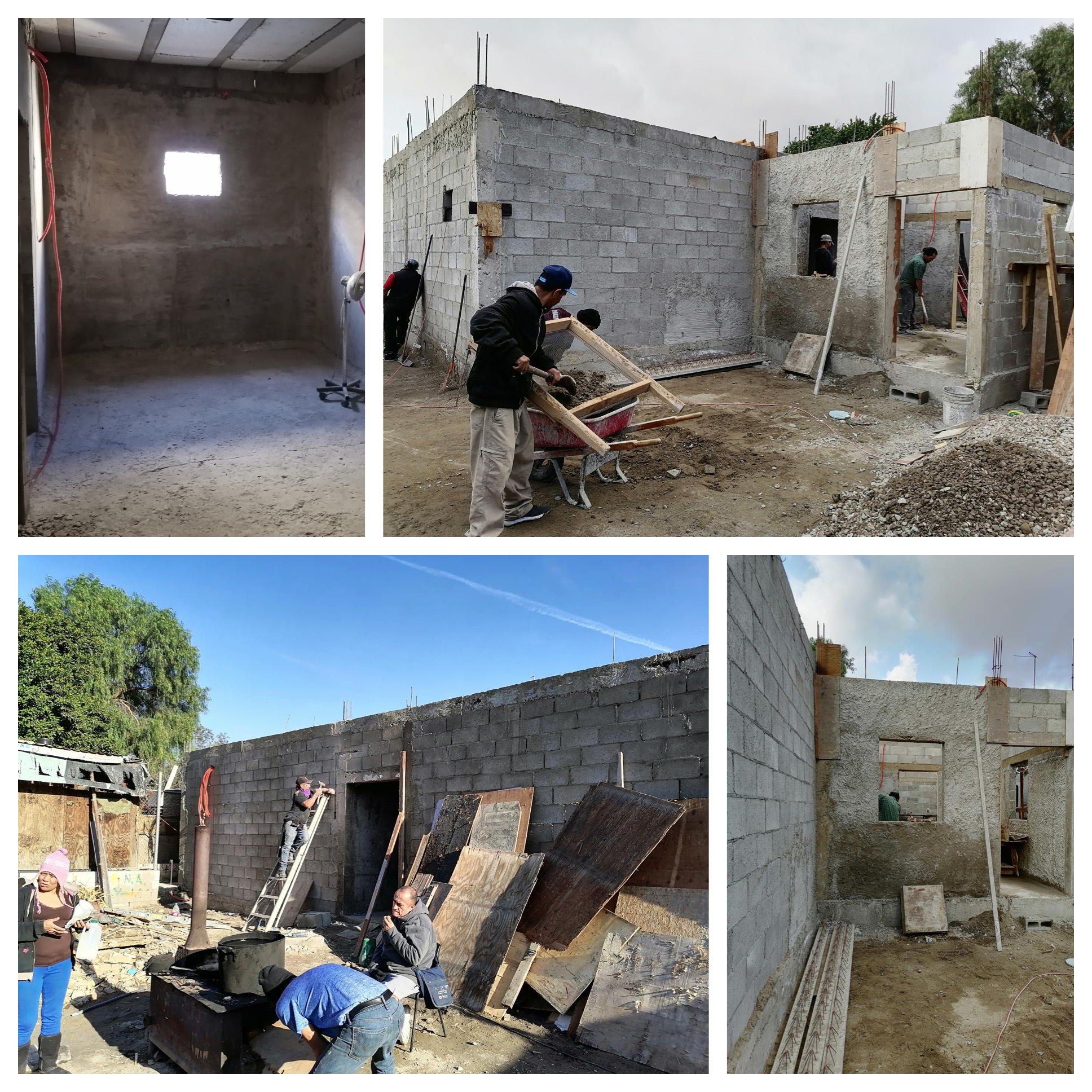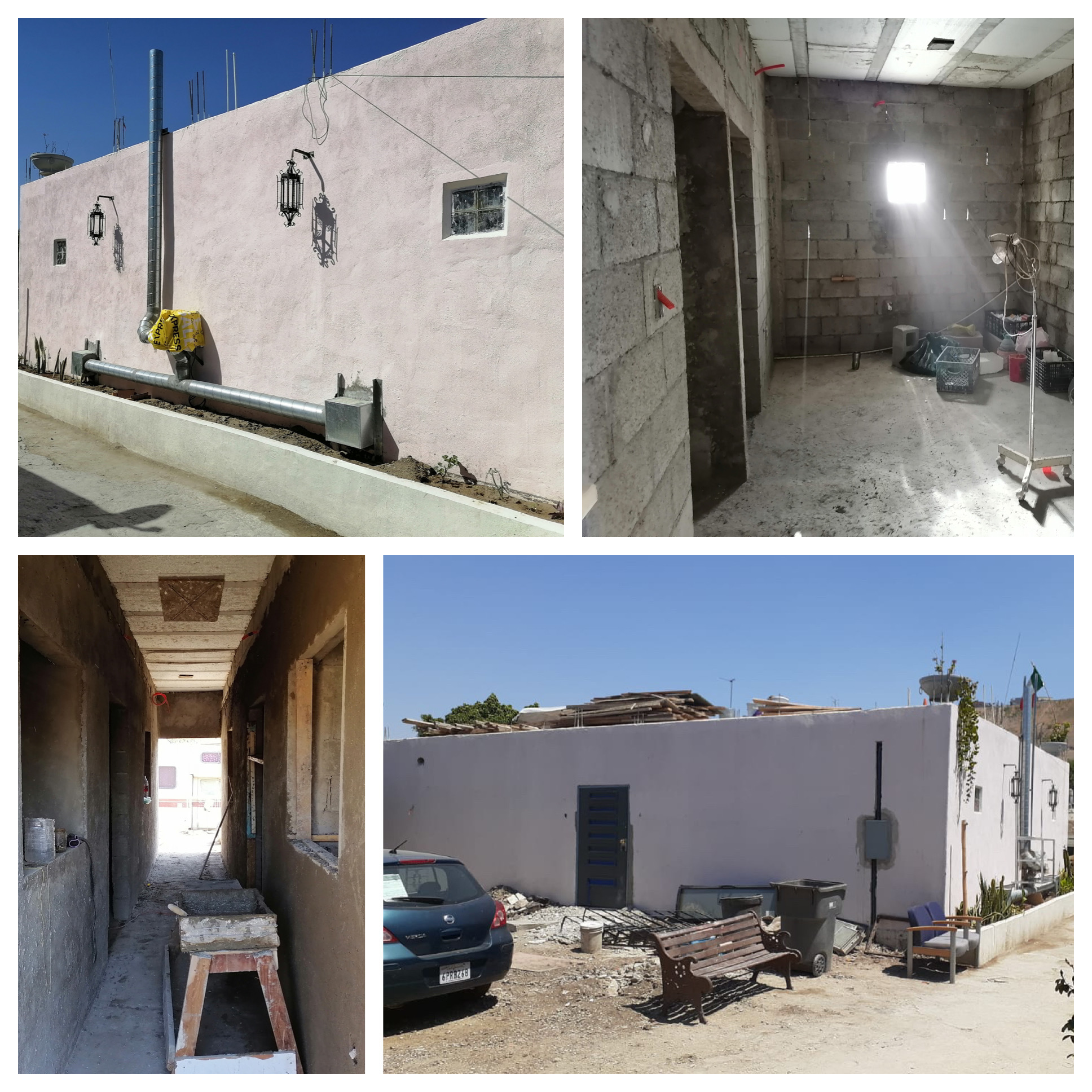2021 SIGH News
This is where you will find current updates on the programs, partnerships, and events we support.
SIGH Grant helps fund building of additional isolation rooms for patients suffering from TB and HIV at Albergue Las Memorias in Tijuana.
(Tijuana, Mexico - August 2021)
Due to the Covid-19 pandemic, care for persons living with HIV and TB has been severely interrupted in Tijuana. At Albergue Las Memorias, a combined Hospital and Hospice in Tijuana that cares for the destitute, they are running out of space to treat the sickest patients. Las Memorias found itself inundated with persons living with HIV that have TB, several of whom have proved to have multi-drug resistant TB and the facility is in desparate need of additional isolation rooms. These infectious deseases are a grave risk to the health of all residents in Tijuana, as well as those in San Diego County, given the proximity and interdependence of the two economies. SIGH was able to grant $10,000 to complete the building of the needed isolation rooms. As soon as La Memorias received the funds the project has pushed forward and should be able to house patients very soon.


Hear success stories from former residents of Las Memorias-- Click here to watch
The OSA Foundation and the India Covid SOS Pulse Oximeter Community Sharing Program receive a SIGH Grant
(India - July 2021)
A simple device can be invaluable in saving many lives. One out of 10 people diagnosed with COVID-19 will require supplemental oxygen to survive. Detecting low oxygen levels early can allow patients to access life-saving oxygen therapy. An oxygen saturation meter is a simple, low-cost device that measures the level of oxygen in a patient’s blood, rapidly identifying those who require oxygen support. Equally important, it can assure the other 9 people that they may not need this critical resource, reserving oxygen supplies for those whose lives depend on it. SIGH's grant to the The Pulse Oximeter Lending Program provided funds for hundreds of pulse oximeters to be purchased and added to the program.
With a community sharing program, a single oxygen saturation meter can be easily disinfected and shared among 10+ people, magnifying the impact of these devices in the community. For each oxygen saturation meter shared among 10 people, one life could be saved.
This program can save lives and preserve supplemental oxygen for those who need it most. Please consider aiding the COVID-19 crisis in India by donating to the oxygen saturation meter community sharing program. Your generous gift will allow us to purchase these oxygen meters at bulk pricing and distribute them for free, ensuring your donation can do the most good for the most people.

Visit the websites for the OSA Foundation (OSA Foundation Covid 19 Relief ) and India Covid SOS (https://www.indiacovidsos.org/ ) to learn more.
You can also watch this short informational video from the OSA Foundation:
Pulse Oximeter Lending Program Video
From "In the News"-UC San Diego Health--SIGH supporting research that could lower cost and increase global equity in healthcare.
(February 2021)
On February 9, 2021, UC San Diego Health published an article entitled, "Can Current Smartphone Technology Tell You When a Pandemic Might Come Calling?", sharing some exciting findings in a research study that SIGH has helped fund.
Click here to read the UC San Diego Health article
The finding were also reported in other online news sources: Med India, The Medical News and Medical Xpress
SIGH acknowledged for providing support in current University of California research vital to COVID-19 response
(February 2021)
Media Release
Vital to COVID-19 response Smartphone pulse oximeters can measure oxygen saturation and heart rate to
FDA Standard says new study. Researchers say some smartphones could also be a future telemedicine
solution for other illnesses such as the flu and tuberculosis
Thursday February 18, 2021 (San Diego, U.S.)—Research from the University of California released in MedRxiv demonstrates for the first time pulse oximeters found in some mobile phones (Samsung Smartphone 9 and S10) meet full FDA clearance Standards and can be used to gauge the severity of COVID-19 infection and identify patients with low oxygen saturation (SpO2) at risk of poor outcomes. Specialists in Global Health (SiGH) provided support for this research.
The combination of lockdowns, self-isolation and shortage of hospital beds brought to bear by the COVID-19 pandemic has highlighted the need for accurate home-based pulse oximetry but this is faced with challenges:
- Inequity in the distribution of accurate oximetry devices globally has been well documented by the WHO
- FDA/ISO cleared pulse oximeter devices cost hundreds of dollars
- At home pulse oximeters currently in use, including those dispensed by large healthcare systems, are inexpensive devices that may be associated with wide variability in accuracy
The authors of the study, Accuracy of Integrated Pulse Oximetry in the Samsung 9/9+ Smartphone performed detailed human hypoxia testing on 12 healthy people who inspired mixed gases to reach stable arterial oxygen saturations between 70% and 100%. Over 257 arterial blood samples were analysed for oxygen saturation and compared to measurements obtained by the smartphone pulse oximeter. Readings from the smartphone were well within the standards required for FDA/ISO clearance for use as a clinical pulse oximeter. This is the first report of smartphone derived pulse oximetry measurements that meets full FDA/ISO accuracy certification requirements.
“Smartphones with sensors and apps could significantly enhance remote monitoring due to their ubiquity, and don’t require patients to have additional expensive gadgets,” said Sara H. Browne, MD, professor of clinical medicine in the UC San Diego School of Medicine and an infectious disease specialist.”
According to the Authors both S9 and S10 Samsung Galaxy smartphones contain the same dedicated pulse oximetry indicating there are over a 100 million smartphones currently in circulation that could be used to take accurate pulse oximetry measurements. The Authors conclude by urging Industry to pursue Emergency Use Authorization clearance with the FDA to support the expanded need for accurate at home pulse oximetry during the current pandemic.
Specialists in Global Health also supported a peer-reviewed study recently published in the journal CHEST on the accuracy and precision of smartphone pulse oximetry by Researchers from the University of California, San Diego. Using a smartphone with similar embedded hardware to the Samsung smartphone, researchers analysed over 2200 readings taken simultaneously from smartphone pulse oximetry and in-hospital Welch-Allyn instruments in a wide range of persons and found equivalent measurement accuracy and precision.
Accurate smartphone pulse oximetry over multiple geographical locations on demand is of immense practical medical importance globally, particularly in LMICs. During respiratory viral pandemics accurate pulse oximetry is used by medical practitioners in triage, initial clinical management.
The researchers state that with this kind of accuracy S9 and S10 pulse oximetry could be used during virtual telemedicine visits to provide data Healthcare providers need in their assessments. As this technology is smartphone based, during pandemics willing patients could allow their data to be connected to regional hospitals and national data hubs, enabling large-scale regional data analysis in near-real time to estimate resource requirements.
The authors suggest smartphone pulse oximetry may empower patients by storing at home readings to present to hospital triage or medical practitioners.
“Post pandemic this capability has wide global utility with relevance to acute and chronic cardiopulmonary diseases, including influenza and TB, and postoperative follow-up care,” concluded Browne.
ENDS
Further information:
Michael Kessler
Michael Kessler Media
Mob: +34 655 792 699
Email: michael.kessler@intoon-media.com
Twitter. @mickessler
Notes to Editors
Specialists in Global Health (SiGH) serves as a granting body with a two-fold purpose—First, we provide the connection and means for educating and supporting medical specialist training in developing countries. Second, we provide the access and tools to introduce mobile health technologies into low resource settings. We want to build the infrastructure in developing countries and support the education and training needed for medical professionals to become skilled specialists. Through this process the medical professionals can be with their families while they work to improve health and build strength in their own communities. Ultimately, we want them to become the top specialists in their countries with the knowledge to train other doctors in their communities.
